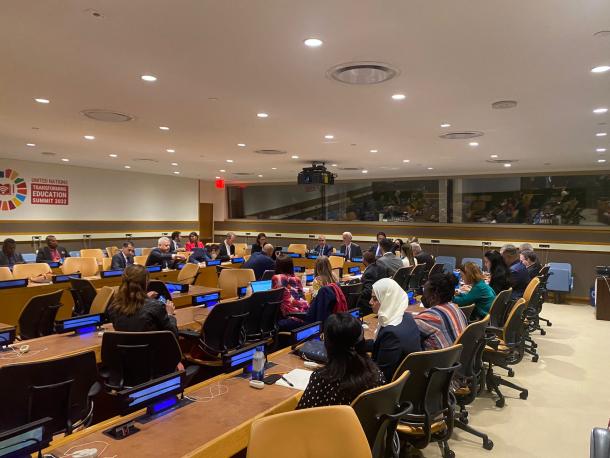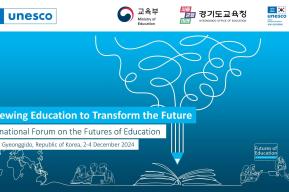Article
Transforming Education Summit: UNESCO’s Global Education Coalition convenes to discuss opportunities for collaboration and scale up

UNESCO, on behalf of the Global Education Coalition, organized several events in collaboration with member organizations and Ministries of Education. These conversations focused on how the Coalition can scale up its impact beyond the COVID-19 recovery and advance the transformation of education through partnerships.
On 17 October, as part of Solutions Day, a private sector roundtable on Enhancing Education Readiness to the Future of Work through Public-Private Partnerships brought together Coalition members and youth representation to explore how Public-Private Partnerships can better support the future-readiness of education systems. Investing in education not only benefits society but also businesses, said Justina Nixon, Vice President for Corporate Social Responsibility at IBM, which reiterated its commitment to upskill 30 million youth by 2030 worldwide.
The private sector can play a key role as a place of learning that also naturally contributes to the evolution of work, suggested William Florance, Government Relations and Program Lead for EMEA at Google. But national governments do need to have clear goals and guide the direction of support from outside players, he added.
The session highlighted how beneficiaries and learners are still often missing from conversations around solutions for skills and learning. Youth representative, Andrea Remes, Co-Founder and CEO of Erandi Aprende, called for “Public-private-people partnerships” that put people, and especially youth, at the center of the co-design process.
Later the same day, a session on Advancing multi-stakeholders’ partnerships to drive education transformation saw Coalition members discuss the critical role of collaboration in tackling the digital divide and ramping up tried and tested solutions.
“The world has the resources, has the means, to address [the digital divide],” said Andreas Schleicher, Director for the Directorate of Education and Skills with the OECD, “but we see education policy as purely domestic, which prevents us from really taking innovative approaches to scale.”
Tech and other private sector companies can drive innovative and systematic approaches, support capacity building, and make accessible technology that, among other things, enables autonomous learning and teacher productivity. But cooperation must happen at a national level, noted Borhene Chakroun, Director of the Division for Policies and Lifelong Learning and Coordinator of the Global Education Coalition. “If the future is built only by one actor, we will fail. It has to be multi-stakeholder,” he said. Heather Johnston, Head of Sustainability and Corporate Responsibility at Ericsson, added that the Coalition must consider “how can we equip decision makers to guide and lead the digital transformation of society for sustainable development.”
During the session, UNESCO, on behalf of the Coalition, also launched a Compendium of Transformational Innovation which spotlights more than 35 initiatives implemented through the coordination of more than 50 Coalition members and other key stakeholders.
Digital transformation for education
Coalition members then convened on 18 October for a meeting to discuss a future Digital Transformation Collaborative where they shared perspectives on the barriers to digital transformation for education. An “enormous information gap” was identified as a key challenge, as well as the need for a sustainable business model to finance the scale up of activities.
“[We have] to aggregate all the knowledge and expertise and the assets that we have as organizations, as members of the Coalition,” said Chakroun. “If we can capture that, document it, share it and use it for action, that would be a great leap that we can consider.”
In many countries, a lack of clear priorities and asks from governments continues to hamper progress for education. The Coalition can play an important role in building the capacity of governments to understand the value of data - whether good or bad - and how this can help them manage their resources effectively, suggested Chris Ashford, Senior Global Strategy Advisor for Education at Microsoft.
Developing a common understanding of what digital transformation looks like and identifying a set of priority countries which can then galvanize other countries were identified as next steps for the Coalition. Members present at the meeting also agreed on the need for a readiness index with indicators and targets for countries to not only measure their progress but clarify their vision for education transformation.
- More on UNESCO’s Global Education Coalition
- More on the Transforming Education Summit








